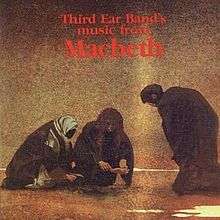Music from Macbeth
Music from Macbeth is a 1972 album by the Third Ear Band. It consists of the soundtrack from Roman Polanski's 1971 film Macbeth, an adaptation of Shakespeare's The Tragedy of Macbeth.
| Music from Macbeth | ||||
|---|---|---|---|---|
 | ||||
| Film score by | ||||
| Released | 1972 | |||
| Recorded | 1971 | |||
| Studio | Air Studios, London | |||
| Length | 43:42 | |||
| Label | Harvest Records (original release) BGO Records (1990 reissue) Blueprint Records (reissue) | |||
| Producer | Andrew King, Third Ear Band | |||
| Third Ear Band chronology | ||||
| ||||
Composition
The band composed original music for the film, by adding electronic music to hand drums, woodwinds and strings.[1] Elements of music in India and the Middle East and jazz were also incorporated into the score.[2]
While the score has some Middle Ages influence, this is not found in the scenes where Duncan is assassinated and Macbeth is killed. Polanski and the band used aleatoric music for these scenes, to communicate chaos.[1]
Track listing
- "Overture" – 4:20
- "The Beach" – 1:54
- "Lady Macbeth" – 1:47
- "Inverness: Macbeth's Return/The Preparation/Fanfare/Duncan's Arrival" – 5:00
- "The Banquet" – 1:21
- "Dagger and Death" – 2:49
- "At the Well/The Princes's Escape/Coronation/Come Sealing Night" – 3:03
- "Court Dance" – 2:28
- "Fleance" – 4:02
- "Grooms' Dance" – 4:21
- "Bear Baiting" – 1:10
- "Ambush/Banquo's Ghost" – 2:27
- "Going to Bed/Blind Man's Buff/Requiescant/Sere and Yellow Leaf" – 3:04
- "The Cauldron" – 2:39
- "Prophesies" – 1:53
- "Wicca Way" – 1:24
(All compositions by Bridges, Sweeney, Minns, and Buckmaster.)
Personnel
- Paul Minns — oboe and recorder
- Glen Sweeney — drums
- Paul Buckmaster — cello and bass guitar
- Simon House — violin and VCS3
- Denim Bridges — guitars
The album also features vocals by a 12-year old Keith Chegwin.
gollark: Or just ask for another chicken. People with chickens seem to really like aeons.
gollark: I have an aeon around. I could possibly accept offers for it.
gollark: Fish gave me my first copper. It's my only CB green, as well.
gollark: Pygmy eggs seem to come in groups.
gollark: When are releases usually, anyway?
References
- Deanne Williams, "Mick Jagger Macbeth," Shakespeare Survey: Volume 57, Macbeth and Its Afterlife: An Annual Survey of Shakespeare Studies and Production, Cambridge University Press, 2008, p. 152.
- Christopher Sandford, Polanski, Random House, 2007, p. 222.
This article is issued from Wikipedia. The text is licensed under Creative Commons - Attribution - Sharealike. Additional terms may apply for the media files.